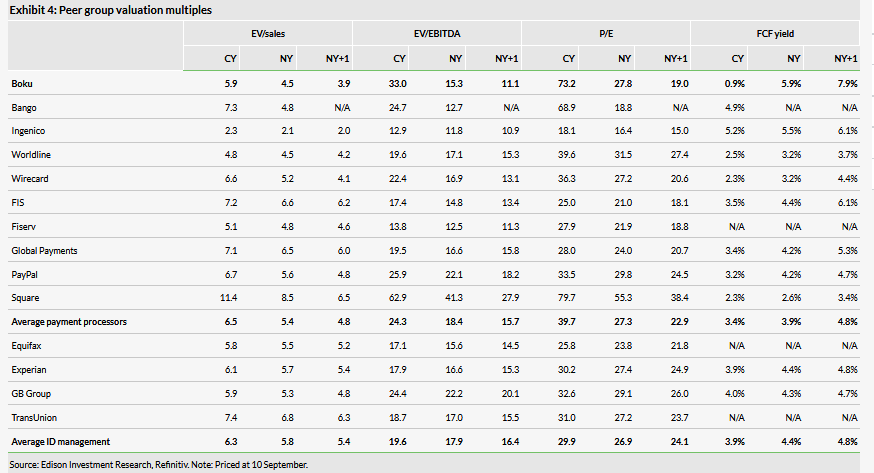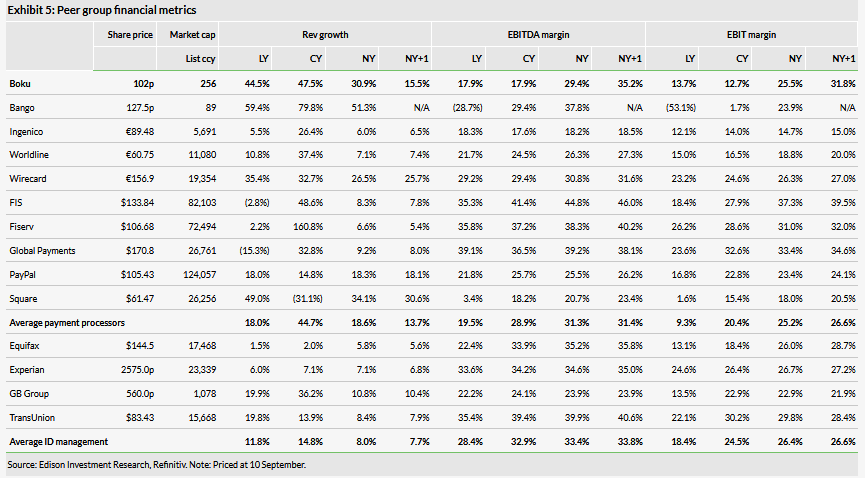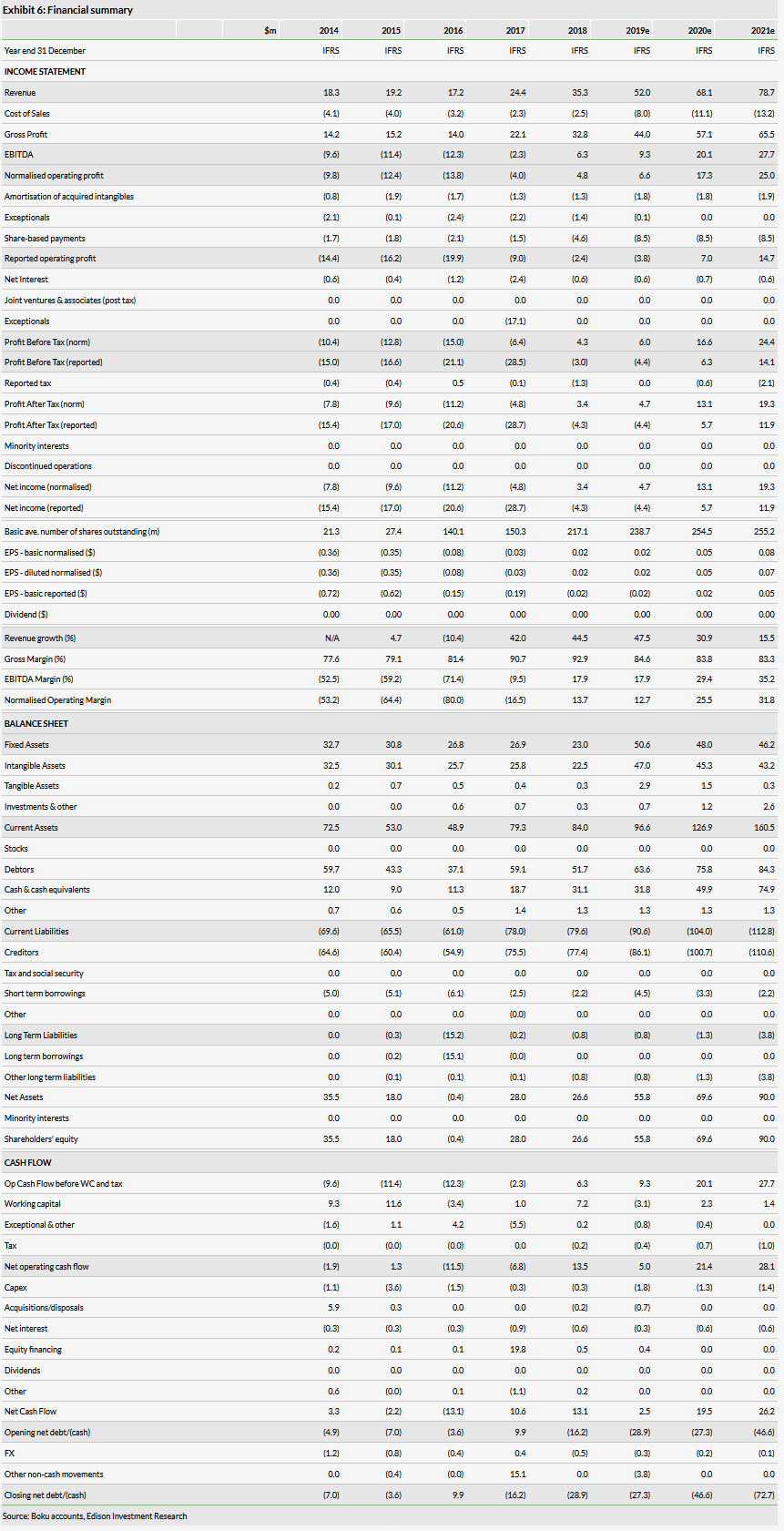Boku Inc (LON:BOKU) reported 39% year-on-year revenue growth in H1: 19% growth from the Payments business was boosted by the newly acquired Identity business. This translated to 69% growth in EBITDA and 64% growth in normalised operating profit, despite investment in the Identity business. Management expects a stronger H2 and is maintaining FY19 guidance. We have taken a more cautious approach to our Identity forecasts reflecting longer sales cycles; this reduces our FY19–21 forecasts, although we expect the company to meet FY19 guidance.

H1 profits grew year-on-year despite investment in Identity business
H119 revenues came in higher than previously flagged in July’s trading update, growing 39% y-o-y to $23.5m. While this growth was impressive, management pointed to several factors (timing of games releases, currency, pace of build out of international connections in the Identity business) that acted as headwinds in the period. EBITDA was 69% higher at $4.3m (18.2% margin) and normalised operating profit grew 64% y-o-y to $3.0m. Payments revenues were 19% higher yoy, resulting in EBITDA of $6.6m (+161% y-o-y). The Identity business saw pro-forma revenue growth of 36% and generated an EBITDA loss of $2.4m.
Current year guidance maintained
Boku maintained guidance for FY19, pointing to the strength of its pipeline, seasonality, expected games releases and positive momentum in the Identity business as supportive of H2 growth. As we think the company is now more likely to meet than beat guidance, we have revised our forecasts to the middle of the guidance range for FY19. We have also reduced our Identity revenue and EBITDA forecasts for FY20 and FY21, reflecting the lengthy sales cycles involved in signing up major merchants and mobile operators.
Valuation: Not fully reflecting growth potential
On an EV/EBITDA and P/E basis, Boku is trading at a discount to peers on FY20 and FY21 estimates. Boku’s strong cash generation is reflected in its above-average free cash flow yield for FY20 and FY21. Confirmation of contract extensions and new merchants for the Identity business as well as evidence of a growing contribution from mobile wallets in the Payments business could help to close the discount to peers.
Business description
Boku operates a billing and identity verification platform that connects merchants with mobile network operators in more than 50 countries. It has c 180 employees, with its main offices in the US, UK, Germany and India.
Review of H119 results
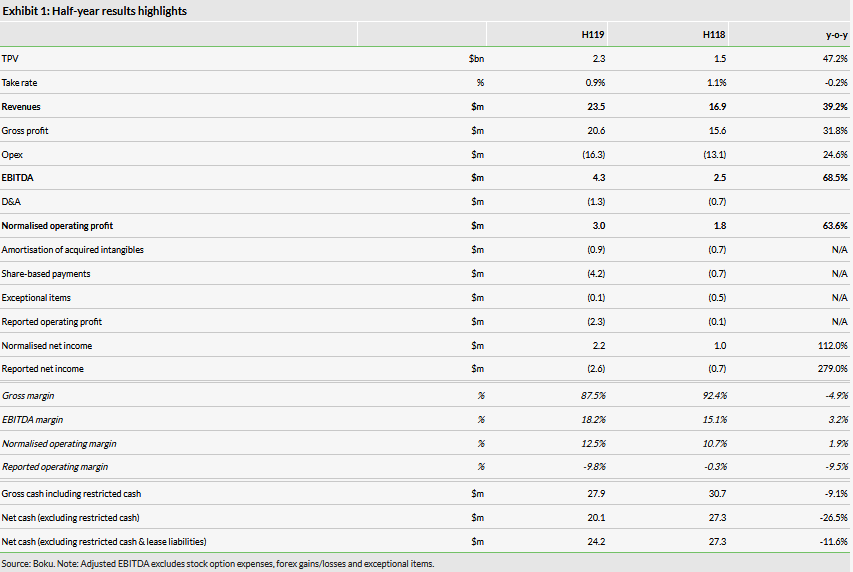
In H119, Boku reported year-on-year revenue growth of 39% (19% organic) to achieve group revenues of $23.5m. This was ahead of the $22.5–23.0m expected from the July trading update, as a recent contract renegotiation changed the revenue recognition for that customer’s business.
Strong revenue growth resulted in a 69% increase in EBITDA despite the Identity business generating a loss (as expected), with EBITDA boosted by the shift to IFRS 16, which removed lease payments in H119. Normalised operating profit (where the impact of IFRS 16 nets off to close to zero) was 64% higher year-on-year. The company reported share-based payments totalling $4.2m (H118: $0.7m), reflecting restricted stock units (RSUs) issued in H218 and H119 as well as higher employer NI costs on these as per IFRS 2. Exceptional costs of $0.3m include transaction costs for the Danal acquisition (completed 31 December 2018 but cash and equity consideration not paid until H119) and the costs of closing a surplus Italian legal entity.
Net cash at the end of H119 was $20.1m compared to $27.3m at the end of H118 and $28.9m at the end of FY18 (we exclude restricted cash from this measure). Once lease liabilities of $4.1m are also excluded (assumed for the first time in H119), net cash was $24.2m. Boku’s cash balance varies in line with the timing of transaction processing and depends on the mix of business (settlement versus transaction); Boku assumed Danal’s working capital requirements on acquisition. Gross cash including restricted cash was $27.9m at the end of H119, with an average gross cash balance of $22.2m in June versus $24.4m in December 2018.
The company generated $2.8m of cash from operations in H119, before working capital consumption of $4.8m. Capex included $0.2m on tangible assets and $0.7m capitalised development costs. The company made a $1m cash payment as part of the Danal consideration, offset by $0.3m cash acquired with the business.
Payments business shows operational leverage

The Payments business saw 47% growth in total payments volume (TPV) to $2.3bn and a 48% increase in monthly active users over the same period. As expected, the take rate reduced reflecting volume breaks for large customers as well as the continuing shift to the transaction business model (where Boku earns a lower take rate as it does not manage the cash flows). The company noted that demand for Fortnite reached its peak in H118 whereas there has been no such blockbuster game in H119. The strength of the dollar versus sterling and the euro has also created a headwind for revenue growth.
The gross margin expanded further to 95%, which we believe is likely to be the ceiling level for Boku. Adjusted operating costs were lower year-on-year, partly due to the shift to IFRS 16 from 1 January, which replaces lease expenses with depreciation and interest charges, but also due to the sharing of central costs with the new Identity business. The higher gross profit combined with the lower cost base resulted in 161% growth in adjusted EBITDA year-on-year. Even adding back lease costs of $0.9m, EBITDA would have increased 125% y-o-y.
Mobile wallet integrations provide access to Asian consumers
During H1, Boku announced an integration with GrabPay, a mobile wallet developed by Grab Holdings Inc (Grab). Grab is a ‘super-app’ that provides a variety of on-demand services in eight South-East Asian countries (Cambodia, Indonesia, Malaysia, Myanmar, Philippines, Singapore, Thailand and Vietnam) including taxis, food delivery, car hire and electric scooter hire. The mobile app has been downloaded 68m times to date. Grab’s integration with the Boku platform means that merchants can offer GrabPay as a payment mechanism. Boku will then act as the processor of payments, collecting from GrabPay and paying across to the merchant. In the same way that digital content merchants use Boku as a combined customer acquisition tool and payment processor, we expect this will appeal to global merchants wanting to access consumers in South-East Asia.
Mobile wallets are a common payment method in Asia, and this contract marks the first such relationship for Boku. We view this type of integration as a way for Boku to increase its presence in Asia, as direct carrier billing is not commercially attractive in countries such as India or China.
Identity business makes a promising start
The Identity business (owned since the beginning of H119) generated revenue of $3.36m in H119 (+36% pro-forma), a gross profit of $1.44m (43% margin; 27% pro-forma in H118) and an adjusted EBITDA loss of $2.35m. Billable transactions of 141m were 100% higher year-on-year. As the growth in volume was skewed towards lower-value phone number verifications, revenue growth lagged volume growth.
Restructuring the business
When the company announced the acquisition, it had always planned to boost the Identity business’s sales and marketing function, and during the period tripled the salesforce. The amount of restructuring required was more than originally planned, and as more staff left during the period than expected, adjusted operating expenses were lower than anticipated. We would expect costs to pick up in H2 as the company invests further in the business.
Refining the offering
The majority of revenues to date have been generated from phone number verifications and phone data cleansing for its US customer base. The business is focused on growing out carrier connections outside of the US, and should be helped in this process by the relationships that Boku already has with carriers in its Payments business. The company alluded to the fact that this is taking longer than originally anticipated, and we believe this could slow the pace of revenue growth in the business in the shorter term.
Since taking over the Danal business, the company has worked on refining its offering to the carriers and has developed a tokenised ID product. The aim will be to sell this to merchants for ID verification purposes, reducing friction for consumers by replacing one-time password SMSs. The company is currently talking to payment processors and e-commerce providers with a view to them using the tokenised ID product on an international basis. A contract with this type of customer could add significantly to volumes processed and revenues, but the timing of such deals is uncertain.
Outlook and changes to forecasts
Management reiterated guidance for FY19:
Revenues of $52m
Gross margin of 93% for Payments and 40% for Identity
Adjusted EBITDA growth of 45–50% (which implies EBITDA of $9.16–9.48m)
Identity EBITDA loss c $5m
To achieve this would require a significant step-up in revenues in H2, from $23.5m in H1 to $28.5m in H2. Some of this should come from the growth in the Identity business, as international connections are activated and the new sales team wins business. The remainder would come from typical H2 seasonality, the launch of new games, and the roll-out of new connections. The company noted that it has a pipeline of more than 250 deployments, but also noted that some merchants are offering extended promotional periods, delaying the point at which consumers start paying for a service. The required step-up in EBITDA is not so large, from $4.29m in H1 to $4.87–5.19m in H2.
We have revised our forecasts to reflect the lower end of the EBITDA guidance. We have made the following changes:
Revenues: we have slightly lowered TPV in the payments business, but slightly raised take rates, as well as slightly lowering forecasts for the Identity business.
Gross margin: we have increased the Payments gross margin to 95% for FY20 and FY21. We have reduced the Identity gross margin in H219 as the company expects that material contracts would require more competitive pricing.
Amortisation: we have increased our capitalised development cost forecasts for FY19–21 and also the related amortisation. We have also added the amortisation relating to the intangibles created when Danal was acquired.
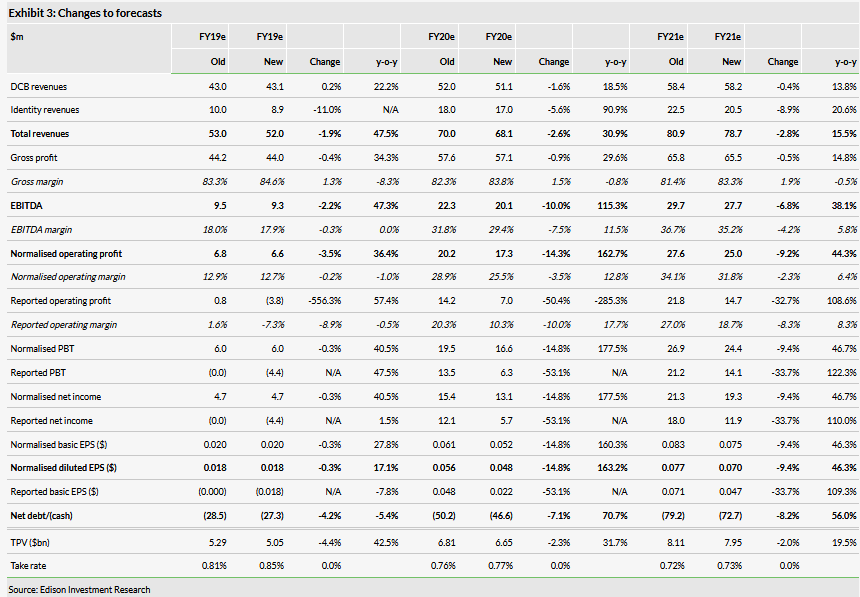
Share-based payments: we have increased our forecasts to reflect the amounts reported in H119.
Valuation
The stock is up 53% year-to-date, but has declined 16% since the July trading update (or -12% relative to the FTSE AIM All Share). On our revised numbers, Boku is trading at a discount to peers on FY20 and FY21 forecasts, with revenue growth at the top end of the range, and EBIT margins in line with peers in FY20 and in the upper end of the range in FY21. Key to closing the valuation discount will be the ability to continue to demonstrate growth in the Payments business while building the Identity business and moving it to profitability.
